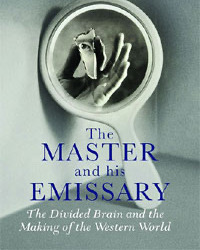#Iain McGilchrist
Quote
The illusion that, if we can see something clearly, we see it as it really is, is hugely seductive. Ruskin, in Modern Painters, makes the point that clarity is bought at the price of limitation: 'We never see anything clearly . . . What we call seeing a thing clearly, is only seeing enough of it to make out what it is; the point of intelligibility varying in distance for different magnitudes and kinds of things . . .' He gives the example of an open book and an embroidered handkerchief on a lawn. Viewed from a distance of a quarter of a mile, they are indistinguishable; from closer, we can see which is which, but not read the book or trace the embroidery on the handkerchief; as we go nearer, we 'can now read the text and trace the embroidery, but cannot see the fibres of the paper, nor the threads of the stuff'; closer still and we can see the watermark and the threads, 'but not the hills and dales in the paper's surface, nor the fine fibres which shoot off from every thread'; until we take a microscope to it, and so on, ad infinitum. At which point do we see it clearly? 'When, therefore, we say, we see the book clearly', Ruskin concludes, 'we mean only that we know it is a book.' Clarity, it seems, describes not a degree of perception, but a type of knowledge. To know something clearly is to know it partially only, and to know it, rather than to experience it, in a certain way.
Iain McGilchrist, The Master and his Emissary
321 notes
·
View notes
Text

[Thanks Ian Sanders]
* * * *
“We cannot take refuge in fantasies of either omnipotence or impotence. The difficult truth is less grand: that there is a something apart from ourselves, which we can influence to some degree. And the evidence is that how we do so matters.”
― Iain McGilchrist, The Master and His Emissary: The Divided Brain and the Making of the Western World
#quotes#Iain McGilchrist#The Master and His Emissary: The Divided Brain and the Making of the Western World#mind/brain#strategy#decision making
49 notes
·
View notes
Text
Attention is a moral act: it creates, brings aspects of things into being. The quality of your life depends quite a bit on the quality of attention you project out onto the world.
-Iain McGilchrist
2 notes
·
View notes
Text
In awe resides the transcendent…
Iain McGilchrist, Blake Society Annual Lecture.
#philosophy tumblr#philoblr#depth psychology#philosopher#psychiatrist#iain mcgilchrist#williamblake#phenomenology#esotericism#transcendental#idealism#theosophy#dark academia#life quotes
10 notes
·
View notes
Text
Not ignorance, but ignorance of ignorance, is the death of knowledge.
— Iain McGilchrist
2 notes
·
View notes
Text
youtube
Art, God and beauty, Roger Wagner in conversation with Iain McGilchrist
Drawing that hints at meaning, layers and marks that represent other things because there are layers of meaning implicit in everything and when something is made explicit then we reduce it’s potential. It becomes stifled.
2 notes
·
View notes
Quote
The model we choose to use to understand something determines what we find.
Iain McGilchrist
3 notes
·
View notes
Text

The Master and His Emissary: The Divided Brain and the Making of the Western World ist ein 2009 erschienenes Buch des Psychiaters Iain McGilchrist, das sich mit der spezialisierten hemisphärischen Funktion des Gehirns beschäftigt. Die unterschiedlichen Weltanschauungen der rechten und linken Gehirnhälfte (im Titel "Meister" bzw. "Gesandter") haben, so der Autor, die westliche Kultur seit der Zeit des antiken griechischen Philosophen Platon und dem wachsenden Konflikt zwischen Diese Ansichten haben Auswirkungen auf die Art und Weise, wie sich die moderne Welt verändert. Teilweise überprüft McGilchrists Buch, das das Produkt von zwanzig Jahren Forschung ist, die Beweise früherer verwandter Forschungen und Theorien, und basierend auf diesen und kulturellen Beweisen kommt der Autor zu seinen eigenen Schlussfolgerungen.
Der Meister und sein Gesandter erhielten bei seiner Veröffentlichung überwiegend positive Kritiken. Kritiker lobten das Buch als wegweisende Veröffentlichung, die die Sichtweise der Leser auf die Welt verändern könnte. AC Grayling kommentierte das Buch jedoch, dass "die Erkenntnisse der Hirnforschung noch lange nicht feinkörnig genug sind, um die großen psychologischen und kulturellen Schlussfolgerungen zu unterstützen, die Iain McGilchrist zieht".
The Master and His Emissary wurde für den Bristol Festival of Ideas Book Prize 2010 nominiert und für den Royal Society Prize for Science Books 2010 nominiert.
2 notes
·
View notes
Text
"In Defense of Truth as Participation," my McGilchrist Conference Presentation
First, here’s a clip of Iain McGilchrist’s impromptu remarks on the opening night of our “Metaphysics and the Matter With Things” conference (which happened to be Good Friday).
Next, my welcome and opening comments about the conference (partial transcript to follow):
Welcome to CIIS. I’m Matt Segall. I’m an associate professor here in the Philosophy, Cosmology, and Consciousness program. I’m…

View On WordPress
0 notes
Text
The Psychological Drivers of the Metacrisis: John Vervaeke, Iain McGilchrist, Daniel Schmachtenberger | Dec 5, 2023
Dec 5, 2023
This is a conversation between Iain McGilchrist, John Vervaeke and Daniel Schmachtenberger, recorded at Merton College, Oxford, in September 2023. With no planned objective or agenda, the discussion sought to outline the cognitive and spiritual components of the metacrisis. The metacrisis is the total ecosystem of all global crises and the common underlying dynamics that generate…
View On WordPress
1 note
·
View note
Quote
In other words, language is necessary neither for categorisation, nor for reasoning, nor for concept formation, nor perception: it does not itself bring the landscape of the world in which we live into being. What it does, rather, is shape that landscape by fixing the 'counties' into which we divide it, defining which categories or types of entities we see there - how we carve it up.
[...] The Sapir-Whorf hypothesis has partial truth - if you don't have the word, you are likely to lose the concept; but this research demonstrates that the concept can arise without the word, and is therefore not dependent on it. So thinking is prior to language. What language contributes is to firm up certain particular ways of seeing the world and give fixity to them. This has its good side, and its bad. It aids consistency of reference over time and space. But it can also exert a restrictive force on what and how we think. It represented a more fixed version of the world: it shapes, rather than grounds, our thinking.
Iain McGilchrist, The Master and his Emissary
207 notes
·
View notes
Text

Edinburgh Scotland 1920
* * * *
“People say “what can I do”……
All the important changes happen from within ourself, not out there…
So my recommendations might be simple. Begin by cultivating a sense of awe and wonder, rather than clever, clever knowingness about the extraordinarily complex and beautiful cosmos, which it is a pure gift that we have been given a life in.
Think about what we are to do with it and in order to do that well, have compassion to others and all the living world, not a sense of aggressive embattlement against forces that we quite probably misunderstand.
And to begin to adopt a sense of the little that we know….in other words a kind of, not willing ignorance, but the beginning of true knowing which is when we recognise how little that we know….that is the first step towards true knowledge.
For this to happen , we need to understand ourself anew….know thyself….we need every insight we can get into what we are doing to ourself, to life itself and to our inexpressively beautiful and complex world.
I hope I may have here offered one such insight however small.
The work is great, but we are capable of greater things than we know.“
~ Dr Iain McGilchrist, 'Darwin Lectures 2024'
+
“The reciprocal truth of the observer changing what is observed is that what is observed changes the observer. This was a view espoused by Goethe, and not just in the obvious ways you might imagine. According to him, we literally grow faculties. He held that an object properly contemplated generates in the beholder the faculty proper to its own perception: ‘Every new object, well contemplated and clearly seen, opens up a new organ within us’. Contemplation of the world in a spirit of openness and humility fundamentally enlarges our being, where dogma and complacency simply narrow it.
Equally it enables the greater reality of the cosmos – whatever it may be – to fulfil itself through us.”
~ Iain McGilchrist, 'The Matter with Things: Our Brains, Our Delusions, and the Unmaking of the World'
[Thanks Ian Sanders]
#Iain McGilchrist#quotes#The Matter With Things: Our Brains Our Delusions and the Unmaking of the World#contemplation#Edinburgh#from above
10 notes
·
View notes
Text
Entre Aspas
“O ser humano está preso na lógica e deixando de pensar”
(Iain McGilchrist)
View On WordPress
#Entre Aspas#humanidade#humano#Iain McGilchrist#intuição#lógica#M.Rapaz#McGilchrist#mente#pensamento#Vida
1 note
·
View note
Text
''…for us as human beings there are two fundamentally opposed realities, two different modes of experience; that each is of ultimate importance in bringing about the recognisably human world; and that their difference is rooted in the bihemispheric structure of the brain. It follows that the hemispheres need to co-operate, but I believe they are in fact involved in a sort of power struggle, and that this explains many aspects of contemporary Western culture.''
-Iain McGilchrist, The Master And His Emissary: The Divided Brain And The Making Of The Western World
0 notes
Text
The model we choose to use to understand something determines what we find.
Iain McGilchrist, The Master and His Emissary: The Divided Brain and the Making of the Western World.
#philosophy tumblr#philoblr#developmental psychology#philosopher#psychiatrist#iain mcgilchrist#ontology#phenomenology#teleology#dark academia#life quotes
16 notes
·
View notes
Text
Music does not so much free time from temporality as bring out an aspect that is always present within time, its intersection with a moment that partakes of eternity.
Iain McGilchrist, The Master and the Emissary
0 notes